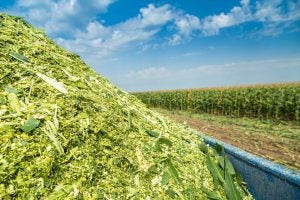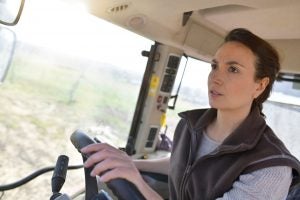Fall harvest season will be here in a flash. And while we all have different types of operations, it’s hard not to understand how important harvest is to the business of farming and to the family members involved. I want to give you a peek into our lives this time a year — as I’m sure there is much fellow producers can relate to.
These are the things we are doing on our farm in preparation for another busy harvest season.
1. Silage or shelled corn?
We are a diversified operation so have cattle and crops. One of the first decisions we make in August is how much silage we need. We will figure out our hay numbers, cattle numbers, think through how many calves we’ll be feeding and figure out some rough numbers. All while keeping in mind the cost of production and how tempting eight dollar plus corn was last winter/spring.

Do we need to cull some cattle so we don’t feed the corn? Is there a cheaper feed alternative? With the droughts all over and large scale culling happening, do we really want to cut our cattle numbers? How is the corn looking? Is it going to produce well or did the heat stress get to it? With the corn that is chopped for silage, what will get planted behind it. Where can we get the seed, and what other inputs will we need for it?
2. Equipment
No matter how thoroughly you check the equipment, or even take it to the shop for repairs before harvest, you’re going to have break downs. Regardless, take it through your shop or pay someone else. Fix the things that were wrong last year.
Take inventory of belts, chains, bearings, etc. What parts you have on hand versus what you might need. Stock up on the consumables (oil, coolant, grease, fuel, windshield cleaner, paper towels, etc.). Check the toolbox or tool pickup or trailer. Make sure the basics are in there. Replace the wrench you borrowed for the swather that one time and never put back.

If you live on the highway, make sure you get everything out earlier than anything would potentially be ready and park it there to get the county talking. (I’ve learned highway farming is a lot different than back road farming where I grew up.)
3. A plan
Stick with me here, but do some scouting and see which fields may be ready first. Have a conversation with your help about what you think might happen. I understand this isn’t really what’s going to happen, but an idea is at least there.
I’m in a lot of farmer wife’s groups and see a lot of posts about how new farm wives aren’t sure where the fields are. When delivering meals they get lost and their farmer is less than willing to chat to get them there while they are busy operating the equipment. Make a map. Maybe while you’re scouting, take them with you. If it’s anything like our operation, take a minute to explain where to drive/park once at the field.
It may seem very elementary to you, but I can guarantee your wife/husband is not thinking the same as you are. If you don’t explain, they will do what they think best and it may not be what you’re wanting. Fix the problems you can fix now, so they aren’t problems then.
4. Food
You still have to eat when you’re harvesting. Are you packing all your food before you walk out the door? Does someone bring you food? If so, do you stop the crew and eat together picnic style in the field? If not, suggest some foods that you would like/be able to eat while operating equipment. If you have crew members that are new or only harvest help, have them write down likes, dislikes or allergies. If you have somebody who brings you food, thank them profusely every single time they show up with it. I’m talking extreme gratitude here! That job is severely under-appreciated.

On our operation, my father-in-law, my husband, and I are full time. My mother-in-law has a town job and helps immensely when she can. The nights she brings us food is the biggest blessing. Otherwise I’m packing the food we need for the entire day before leaving the house in the morning. Maybe you’re not going to provide food for your hired help. Make sure that’s clear so they can plan accordingly. Whoever is in charge of food, make sure you have the drinks conversation too. For us, it’s understood that everybody has their own drinks for the day whatever that looks like, unless otherwise stated. Think through how that food is getting transported. Will you be using reusable containers or throw away. If single use, do you have them or need to get them?
5. Don’t lose sight of loved ones
Last, but certainly not least, if you are in a relationship, go out for a nice date night before harvest starts. Maybe go big and do a whole day of quality time with your spouse. Even if you’re not a quality-time love language person, harvest is a lot of not seeing each other. And if you are sometimes, it’s not the quality one looks for. (I work with mine and see him a lot during harvest, but it is not the same!)
If your partner isn’t familiar with farming or is newer to farming, explain what harvest time looks like. Make sure you both understand that it’s going to be stressful, hurtful things are going to be said, there are going to be plans changed and events missed. It’s a season. Take the time to celebrate when it’s over before moving on to the next big thing on the farm. Stay safe and happy harvesting!
Kelsey Pagel is a Kansas farmer. She grew up on a cow/calf and row crop operation and married into another. Kelsey and her Forever (Matt) farm and ranch with his family where they are living their dream and loving most of the moments.



